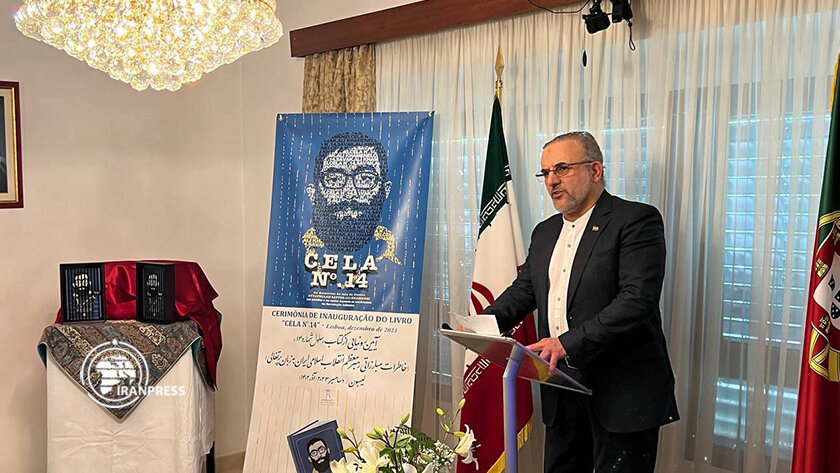"Cell No. 14”: superiority of patience and logic over coercion and power-seeking

The unveiling of “Cell No. 14”, the autobiography of the Leader of the Islamic Revolution, Ayatollah Seyyed Ali Khamenei, in Lisbon on December 14 marked a significant milestone. This book, containing cherished memories and personal reflections of Ayatollah Khamenei, sheds light on the struggles and triumphs of the Islamic Revolution.
“Cell No. 14” serves as a powerful testament to the triumph of patience and logic over coercive and power-centric reasoning and its influence goes far beyond any specific religious or national boundaries.
It is an undeniable truth that our ability to produce genuine cultural products has been weakened. The stark contrast in the perceptions of visitors to Iran before and after their encounters with our nation, coupled with the enduring hardships faced by chemical warfare veterans and the plight of thalassemia and EB patients, who suffer due to medicine sanctions, are mere snippets from the tale of Iran's oppressed nation and the relentless cruelty imposed by its disguised adversaries, particularly within the Western world.
In this regard, "Cell Number 14" emerges as an extraordinary work of literature, an embodiment of tangible experiences that transcend the boundaries of time, place, nationality, religion, and moral codes. Its reach stretches to encompass the history of oppressed nations in the remotest corners of the globe, capturing the essence of their struggle for independence. Moreover, it delves into the blood-soaked battles fought by numerous Asian, African, and American countries, reminding us of the not-so-distant past.
During the recent unveiling ceremony of the book "Cell Number 14" in Lisbon, attendees, including resident ambassadors, shared their experiences that led to liberation from exploitation, colonization, and apartheid, bringing about freedom and independence for their nations.
Reflecting on their respective journeys, the Algerian ambassador highlighted a 132-year resistance, culminating in Algeria's independence in 1962 with the sacrifice of over 1.7 million Algerians.
Echoing similar sentiments, ambassadors from Cuba, South Africa, and Venezuela shared their nations' struggles and victories. The Palestinian ambassador emphasized that his people confront the bloodiest pages of contemporary history in their enduring resistance against the crimes of the Zionist regime, underscoring that faith in reality and resistance is paramount in their struggle.
An intriguing point of agreement among all ambassadors and guests was that the definitive outcome of resistance and this hard experience will undoubtedly bear fruit through the possession of strong and dynamic logic.
In his remarkable book, the author skillfully transports readers to a tangible and realized space through simple yet comprehensive literature. The book's narrative is devoid of imposing or imaginative elements, resulting in a striking sense of concreteness and realization.
Drawing parallels to historical milestones such as the independence struggles of Algeria, India, and Indonesia, as well as the successful eradication of apartheid in South Africa, the author illustrates that the victorious Islamic Revolution stands firmly alongside these pivotal events. It is not a mere slogan or an accidental occurrence but a profound and enduring transformation that has left an indelible impact on Iran and the world.
To put it succinctly, the doctrine of perseverance has emerged as a gift, bestowing victory and definitive outcomes upon those who embrace it. The application of intelligence in formulating this doctrine has been directly linked to its success rate, ensuring efficiency and efficacy.
Just as the Indian people sought to end colonization and exploitation, the logic of the Palestinian people centers around the cessation of occupation, while South Africa's logic focused on the abolishment of apartheid. Similarly, the Iranian Islamic Revolution represented the desire to break free from dependence and the monarchy system.
In the era of information abundance, the portrayal of the Palestinian people as terrorists and the denial of their legitimate right to self-defense against the Zionist occupation regime are disdainful acts that threaten global peace and security.
The recent veto exercised by the United States within the Security Council resolution stands as a glaring symbol of Palestinian sovereignty and the steadfastness of their supporters. It highlights the ongoing abuse of power as the sole recourse by the Zionist regime and its U.S. ally.
The fundamental reason behind these actions is the lack of legitimacy for Israel to continue its occupation of Palestinian land.
Perhaps the ultimate message conveyed in the thought-provoking book, "Cell No. 14," can be summarized as follows: victory is the undeniable outcome of resistance grounded in justice.
This is a divine promise that has been repeatedly experienced throughout history, not solely reserved for prophets, imams, or community leaders. Today, the right to shape one's own destiny is recognized as a foundational principle in international law, aligned with the principles and objectives of the United Nations Charter and the Universal Declaration of Human Rights. Realizing this right necessitates intelligent resistance and purposeful patience.
